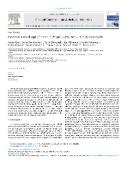Dystonia: A novel sign of the Smith-Magenis syndrome – A three-case report

Autor
Kunc, Lukáš
Skorvanek, Matej
Zech, Michael
Datum vydání
2024Publikováno v
Clinical Parkinsonism & Related DisordersNakladatel / Místo vydání
Elsevier Ltd.Ročník / Číslo vydání
11 (August)ISBN / ISSN
ISSN: 2590-1125ISBN / ISSN
eISSN: 2590-1125Informace o financování
UK//COOP
FN//RVO-VFN64165
MZ0//NU23-07-00281
MSM//LX22NPO5107
Metadata
Zobrazit celý záznamKolekce
Tato publikace má vydavatelskou verzi s DOI 10.1016/j.prdoa.2024.100267
Abstrakt
The Smith-Magenis syndrome (SMS) is a rare genetic disorder caused by a microdeletion in the 17p11.2. region or a pathogenic variant of the RAI1 (retinoic acid-induced), which is located in the 17p11.2 area. In most cases, SMS is caused by a heterozygous de novo deletion. Sometimes inherited mutations of the RAI1 are described, suggesting an autosomal dominant inheritance. There is a broad spectrum of symptoms, including distinctive facial features, skeletal malformations, varying intellectual disability, speech, motor skills delay, sleep disturbances, and self-injurious or attention-seeking behaviors. Despite an extensive literature review, the manifestation of dystonia remains absent from documented cases. Dystonia represents a notable clinical symptom, the recognition of which may prompt the initiation of genetic testing and facilitate precise diagnostic assessment.
Klíčová slova
Dystonia, Smith-Magenis syndrome, Case report, Genetic disorder
Trvalý odkaz
https://hdl.handle.net/20.500.14178/2737Licence
Licence pro užití plného textu výsledku: Creative Commons Uveďte původ 4.0 International







